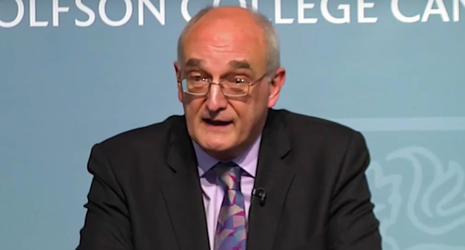Cambridge Vice-Chancellor appeals for resolution to Brexit uncertainty
Sir Leszek Borysiewicz has called for the status of EU citizens in the UK to be settled quickly

The University of Cambridge’s Vice-Chancellor, Sir Leszek Borysiewicz, has called for the status of EU migrants in the UK to be resolved “as quickly as possible”.
He also said that he would be “looking to hold [Leave campaigners] to the fire and say that they have to deliver on those promises that they made.”
Speaking to the Financial Times, Borysiewicz said: “It is the uncertainty that doesn’t help at the moment”, appealing for a resolution to be reached quickly so that people “can make decisions around their commitment to Britain, about the families they have with them.”
In addition to concerns about the loss of EU funding, the higher education sector in the UK is also worried about what the UK's eventual arrangement with the EU will mean for universities' ability to attract staff and students from the continent.
Appealing for calm, Borysiewicz said that universities losing out on research collaborations with European partners was something he had “not noticed… at Cambridge at all”, encouraging colleagues to continue to apply for EU funding until Brexit has been formalised.
Varsity has previously reported on how the University could stand to lose “£60m of EU money, £20m from fees, £10m from English teaching, and £5m each from industry and charities”, according to Professor Ross Anderson.
Despite the uncertainty caused by last month’s referendum, Borysiewicz points out that the University of Cambridge has “weathered many periods of uncertainty” and is confident that the University will be able to retain its position relative to other institutions worldwide.
“We are a leading global institution and I am confident we can maintain that place. It would have been easier had we remained in the European Union […] but I have to look now as to how to progress and for how the sector should progress.”
However, he warned against the possibility of restricting the number of people permitted to come to Cambridge and other universities from abroad once the UK cuts ties with Brussels, saying it would risk “serious damage” to higher education.
Instead, Borysiewicz advocates for an arrangement that is “as close as possible to having good freedom of movement” with the EU, “particularly in the areas of science and technology” – a case he would be willing to put to the next Prime Minister.
Whoever the victor of the Conservative’s leadership contest turns out to be, Cambridge’s Vice-Chancellor – whose own tenure will come to an end next year – hopes there will be “real leadership coming from them in recognising that migrants actually very often enhance where the United Kingdom is going. That might not resonate easily, but it is something that is essential.”
In a statement released to all staff and student last Friday, Borysiewicz addressed a rise in instances of reported racism since the referendum vote. He said he was conscious “that times like these can reveal divisions within communities.”
“These divisions, as we have heard from various anecdotal and media reports, can lead to a rise in abusive and xenophobic behaviour,” he said.
“While there are no indications that these kinds of incidents are happening within the University, it would be wrong to assume that our staff and students are immune from them.”
“Cambridge has always thrived,” he added, “by seeking to maintain an open, diverse and multi-national community that is inclusive of all aspects of gender, race, disability, sexual orientation and religion.”
 News / SU reluctantly registers controversial women’s soc18 December 2025
News / SU reluctantly registers controversial women’s soc18 December 2025 News / CUP announces funding scheme for under-represented academics19 December 2025
News / CUP announces funding scheme for under-represented academics19 December 2025 Features / Should I stay or should I go? Cambridge students and alumni reflect on how their memories stay with them15 December 2025
Features / Should I stay or should I go? Cambridge students and alumni reflect on how their memories stay with them15 December 2025 Fashion / The art of the formal outfit 18 December 2025
Fashion / The art of the formal outfit 18 December 2025 News / Dons warn PM about Vet School closure16 December 2025
News / Dons warn PM about Vet School closure16 December 2025









